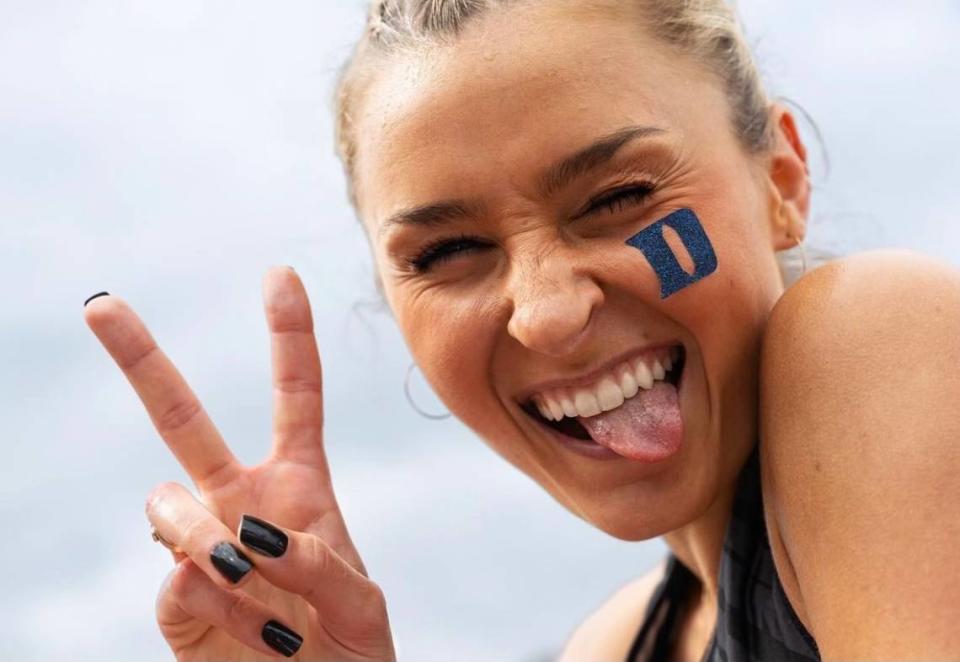One year into NIL era, Duke’s Emily Cole has established herself as a leader in new landscape
Duke junior track and field athlete Emily Cole became enamored with nutrition and eating healthy during her senior year of high school. The multi-sport athlete, who also played basketball and volleyball in Houston, hadn’t previously considered collegiate sports, but put herself in a position where she was now on a trajectory to do so.
But, in trying to practice healthy habits without complete understanding, Cole wasn’t consuming enough food and drinks with sodium. She learned of the deficiency during her senior year of high school when she spent two days in a self-induced coma in response to the abnormally low concentration of sodium in her blood, a condition know as hyponatremia.
The scary moment she experienced inspired her to write a book, Athl-EATS, in conjunction with the Creator Institute, which paired her with an editor and a publisher.
“There’s so much power here behind what we’re eating,” Cole said. “But there’s danger in exploring that on your own.”
It’s been one year since the NCAA granted college athletes the right to profit off of their name, image and likeness (NIL). With the help of her agent, Michael Raymond of Raymond Representation, Cole has leveraged her immense social media following — she’s amassed 68,000 Instagram followers — into NIL deals with H&R Block, Family Dollar, and many others. Cole serves as a blueprint for success in navigating the NIL space.
“She’s so unique, and I think it’s a credit to social media and like this whole NIL space in general because I think that’s what NIL does; it empowers the other athletes, not just the football players and basketball players,” Raymond said.
“But credit to Emily because it’s a full-time job. I mean, the way that she makes content, the way that she puts time into doing these brand deals, the way that she organizes her schedule and gets everything done and gets videos out of her on a daily basis, I think that all goes into building her brand and how she’s done so successfully.”
Financial literacy
Cole is one of 19 women who’ve partnered with H&R Block as part of its ‘A Fair Shot’ program, which invests in sponsorships, tax preparation and financial advice for young female athletes.
“You need to know about what financial investing is, you need to know about the stock market, you need to know how to save money, you need to know what expenses are,” Raymond said, “you know, you need to know that you need to pay taxes.
“A lot of these athletes are not having these conversations, and unfortunately, a lot of athletes are not going to have agents. Some of them might not even have family members that can help educate them on these subjects.”
Cole’s older sister, Julia, who graduated from Duke, introduced her to the financial world. Through their early conversations, and her own research, Cole has come to understand its importance. She believes schools could improve their handling of NIL by providing athletes with financial literacy classes.
“Mandatory or at least mostly mandatory like classes for all the student-athletes,” Cole said. “At the beginning of the year, make everyone sit in the room and teach them about financial literacy. Bring in some of those credible connections you have, incredible resources that you have connections to, and allow them to speak to these athletes.”

Creating her own exposure
Cole has worked hard to generate content that makes her brand a commodity to potential partners through posting her nutrition tips and workout routines. She’s very disciplined in delegating the right amount of time to her social media, her other NIL deals and her book deal. NIL has drummed up interest in Cole’s races, still they’re tricky to find.
“I was competing at the national NCAA and USA championships, and it was still extremely difficult for people to even find results for how I did or watch my race,” Cole said.
That is one of the areas where the inequality between women’s sports and men’s sports is most glaring. And visibility, or lack thereof, plays a considerable role in the NIL space, which in turn has a role in social media following. It is Cole’s social media following and presence, in spite of the lack of exposure her sport receives, drives her NIL deals.
“You know, it is tough, because a lot of these companies are looking more at their social metrics, than the actual sport and the actual story that these athletes have,” Raymond said.
A USC/Purdue study conducted in 2019 concluded that coverage of women’s sports on news and highlights shows only amounted to 5.4 percent of all airtime, a minuscule change from the 5.1 percent in 1993. Cole is an example that an athlete in a non-revenue generating sport can prosper in this new era of college sports.
Women’s sports have shown a steady increase in viewership. Th women’s basketball national championship game between South Carolina and UConn peaked at 5.91 million viewers and was the most-watched title game in 18 years. And the Women’s College World Series topped the Men’s College World Series — which drew 1.63 million viewers — with 1.7 million viewers.
The first year of the NIL era has allowed athletes like Cole to monetize their followings and have their voices heard. Cole wants to use her voice and experience to help chart a path for the next generation of athletes.
“I think that that’s something that I’m really excited about,” Cole said, “is the ways that NIL is going to help give me the opportunity to change the path for a bunch of future female athletes to come and have more opportunities whenever they compete than I did.”

